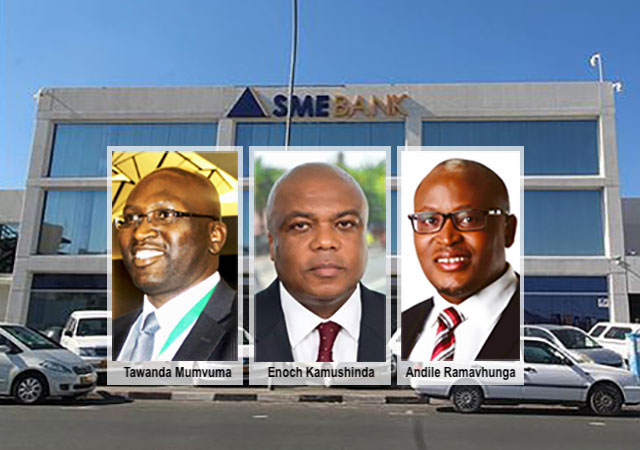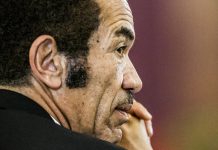By Dewald Van Rensburg | 18 November 2019
EVIDENCE is mounting that South African bank VBS aided in an elaborate bank heist in Namibia by producing fake paper trails and channelling stolen cash to fool regulators and auditors – ultimately leading to the collapse of yet another nascent institution designed to serve the poor and vulnerable.
In February 2017, Namibia’s central bank seized control of the SME Bank – set up to serve the country’s small businesses and rural communities – under circumstances similar to the March 2018 collapse of VBS Mutual Bank.
SME Bank’s Zimbabwean minority shareholders had allegedly siphoned off at least N$380 million, and absconded across the border when authorities started circling. The Namibian government is SME Bank’s majority shareholder.
At least N$270 million of that money flowed to South Africa, with the rest largely lost to Dubai, the bank’s liquidators now believe.
VBS Mutual Bank and individuals associated with it played important roles in the destruction of the SME Bank.
The details are becoming clearer in waves of court proceedings launched by the SME Bank’s liquidators in Windhoek and Johannesburg.
The SME Bank was created in 2012 by president Hage Geingob when he was trade minister. Its board was headed by current home affairs minister Frans Kapofi, who is now doubling up as acting justice minister.
Insolvency inquiries are ongoing in Namibia and South Africa.
Based on current evidence, the SME Bank was probably one of the first instances of VBS Mutual Bank corruption.
VBS allegedly provided two key services to the looters of the SME Bank: faking a N$150 million deposit in the SME Bank’s name to hide the holes in SME Bank accounts, and then channelling N$60 million in real money back to the SME Bank as part- “repayment”.
That N$60 million was almost certainly stolen. The victim of this theft was either a small local asset manager called JM Busha – or VBS Mutual Bank itself.
Initial suspicions about VBS Mutual Bank’s role have now been backed up by solid evidence, in an affidavit filed two months ago in Windhoek by the SME Bank’s legal adviser, Tania Pearson.
Mauwane Kotane, a childhood friend of VBS Mutual Bank’s chief executive Andile Ramavhunga, was at the heart of the alleged theft.
Ramavhunga himself and even VBS Mutual Bank’s disgraced audit partner, Sipho Malaba of KPMG, also seemingly got involved.
VBS general manager of sales Sasa Nemabubuni allegedly produced the false documentation. They all allegedly had a part in a simple task: to pretend the SME Bank’s money was safe in South Africa, when in fact it had long disappeared.
HOW IT WORKED
The SME Bank had allegedly been captured by rogue shareholders who started running it like their personal piggy bank.
First among them was Zimbabwean banker Enoch Kamushinda, who has been fighting a “Stalingrad” legal campaign to stay out of court.
The SME Bank’s Namibian liquidators are suing Kamushinda, the former SME Bank board chair, former chief executive Tawanda Mumvuma, and three of their colleagues.
The liquidators claim the five were involved in theft, fraud and money laundering that resulted in the SME Bank losing at least N$247 million, and possibly as much as N$387 million.
Kamushinda has denied all wrongdoing, and called the Bank of Namibia’s takeover of the bank “unlawful”. In an affidavit, he called the allegations against him “scandalous, vexatious and irrelevant”.
According to the evidence so far, from 2013 onwards, Kamushinda, Mumvuma and their colleagues created fake invoices for the SME Bank to pay – while the money was actually transferred into an array of companies in South Africa.
From there, it disappeared into an elaborate money-laundering network based in Johannesburg.
For instance, the SME Bank purportedly spent N$80 million on “computer software and hardware”, an amount that appeared excessive for such a small bank.
Later evidence suggested the recipient was just a front which distributed the money to other companies for a small margin. By the beginning of 2015, SME Bank’s auditors, BDO, started asking awkward questions.
In stepped Kotane, grandson of the late South African Communist Party leader Moses Kotane. At this point, Kotane was also on the board of the finance and accounting services sector of the Education and Training Authority, tasked with funding trainees in the South African financial sector.
By the end of this affair, the Financial Services Conduct Authority (FSCA) would bar him from working in the sector for 20 years (though Kotane told amaBhungane he is appealing that ruling). He replied to amaBhungane’s questions by saying they are all “sub judice”.
Kotane was a friend of Ramavhunga, the VBS Mutual Bank boss, and very probably the first of VBS’s commission agents – people paid to bring in business.
This commission system later expanded into a massive bribery scheme incentivising municipal officials to deposit money at VBS Mutual Bank, ultimately costing 15 of them a collective N$1,5 billion when VBS crashed.
When contacted, Ramavhunga said he cannot answer any questions about VBS Mutual Bank. In 2015, Kotane scored another major deal, this time with the SME Bank in Namibia.
According to Pearson’s affidavit, Mamepe Capital and the SME Bank signed a “memorandum of agreement for the provision of financial services” on 7 January 2015. This agreement would allegedly become a weapon to throw auditors off the SME Bank looters’ trail.
Pearson alleges the SME Bank’s finance department started retrospectively reclassifying things like the massive “computer” expenditure as “Investment – Mamepe Capital” in their system.
This ruse was allegedly repeated again and again, with fake backdated invoices being produced by the bank using Mamepe’s letterhead. Money previously stolen and yet to be stolen at the SME Bank was disguised as an asset in a new account tied to Mamepe Capital.
In June 2016, the noose was once again tightening when the SME Bank’s auditors demanded to see the investment agreement with Mamepe Capital.
By July 2016, the Bank of Namibia – the central bank – instructed the SME Bank to employ Deloitte, one of the “big four” audit firms, to independently review the bank’s finances. In October, the Bank of Namibia informed the SME Bank that it considered the SME Bank non-compliant with banking regulations.
New ploys were urgently needed.
“With the pressure imposed by the Bank of Namibia as well as the pressure imposed by the external auditors increasing, the fraudsters, particularly Tawanda Mumvuma, Mauwane Kotane of Mamepe Capital and a certain Mr Ramavhunga of VBS Mutual Bank in South Africa, then devised the following scheme,” claims Pearson in her affidavit.
THE FAKE N$150 MILLION
VBS Mutual Bank’s alleged contribution to covering up the looting of the SME Bank took the form of a misleading paper trail.
In July 2016, when the SME Bank was told to let Deloitte review its books, the bank happened to sign a new agreement with Kotane’s Mamepe Capital that now included VBS Mutual Bank as a third party.
VBS was now the “custodian” of money Mamepe Capital was supposedly investing for the SME Bank.
SME Bank chief executive Mumvuma then sent off an application to open a VBS account.
Little over a week later, the account was confirmed. Mumvuma immediately got the SME Bank to transfer N$10 million into this new account. Later investigations suggested that this was the only SME Bank money ever actually deposited at VBS Mutual Bank.
On 17 August 2016, the allegedly false trail was laid.
Mumvuma first emailed Kotane, saying that “as discussed, we intend to liquidate the entire money market portfolio that you are managing”.
According to Pearson, he and Kotane both knew that there was no money market portfolio, but Kotane nonetheless played along. He wrote back that “it should be fairly quick to liquidate the positions as requested … these trades will be executed tomorrow”.
So, now there was correspondence that would make it seem that all involved were convinced of the existence of N$150 million invested with Kotane’s Mamepe Capital. Mumvuma wrote to Kotane again, giving him instructions to move the “liquidated” N$150 million into the new VBS Mutual Bank account.
Now, they just needed someone at VBS to join in the charade. That turned out to be easy.
In a “confirmation of interest” letter dated 19 August 2016, VBS Mutual Bank general manager for sales Sasa Nemabubuni put on record that the SME Bank had invested N$150 million at VBS in a 12-month fixed deposit account.
An account statement was later produced, showing both the N$10 million and N$150 million deposits.
AmaBhungane could not trace Nemabubuni, but this trail of messages now serves as the SME Bank’s liquidators’ clearest evidence that VBS Mutual Bank helped commit fraud. The same method was allegedly employed two weeks later. Mumvuma mailed Kotane to transfer N$25 million to VBS, and another allegedly fake transaction that was duly reflected in the VBS statement.
Now, there was purportedly N$185 million safe and secure at VBS Mutual Bank, which at the time seemed like an up-and-coming entrant to the commercial banking space. But by the end of 2016, the Bank of Namibia was knocking on VBS Mutual Bank’s door, asking questions. This led to a “report of factual findings” being produced by KPMG auditor Sipho Malaba on behalf of VBS Mutual Bank.
This is the same Malaba who would later cover up the looting of VBS Mutual Bank, and who was at this time already secretly on VBS’s payroll. Malaba could not be reached for comment, despite amaBhungane’s best endeavours.
Although Malaba’s written report displayed the disclaimer that it was not an audit, but simply a check of VBS Mutual Bank’s transaction records, it reflected the N$150 million and N$25 million.
When the Bank of Namibia took control of the SME Bank in February 2017, it did an audit that found no trace of this money at VBS Mutual Bank. A total of N$155 million was impaired, which immediately rendered SME Bank insolvent and paved the way for its liquidation.
THE MYSTERIOUS R60M
A second fraud allegedly involving the VBS and SME banks took place on 12 October 2016, one week after the Bank of Namibia had warned the SME Bank about its regulatory non-compliance.
Mumvuma, the SME Bank chief executive, instructed a South African asset manager called JM Busha Investment Group to transfer N$60 million to the SME Bank account at VBS Mutual Bank in exchange for a promissory note.
This note was like a bond. It bound the SME Bank to repay JM Busha the N$60 million plus interest three months later. For some reason, JM Busha agreed to the transaction, despite the SME Bank already being under scrutiny by auditors and the Bank of Namibia.
The liquidators have not made up their minds about the role played by Busha, whose principal, Joseph Makamba Busha, ran in Zimbabwe’s presidential elections in 2018 as the candidate of the FreeZim party. He came in fourth.
Busha told amaBhungane that he was pursuing SME Bank for his money: “I deal with a lot of institutions. I don’t know any of these guys personally.”
Pearson noted: “It appears to the liquidators that Mr Busha contends that he may also have been defrauded by Mr Mumvuma to transfer the N$60 million… this investigation is still continuing.” Whether or not JM Busha was defrauded, VBS Mutual Bank received the N$60 million the following day, 13 October. It immediately paid N$2,7 million onward to an obscure entity called Base Data (which ultimately received N$68 million from the SME Bank largely through other channels).
A day later, VBS Mutual Bank paid N$37 million to the SME Bank in Namibia. This was, according to Pearson, supposed to look like one of the Mamepe Capital investments “maturing”. Later in the month, VBS Mutual Bank paid N$10 million to an account in the name of ZE2 Ample, another company belonging to Kotane. He has since claimed this was fee income due to him. This was funded by the initial N$10 million the SME Bank had put into VBS Mutual Bank.
Finally, in November, VBS paid the R20 million balance of the N$60 million ostensibly belonging to the SME Bank to Mamepe Capital, which paid it on to the SME Bank “again as if it was one of the alleged matured investments mentioned by Kotane in his affidavit”, said Pearson.
The story of where this N$60 million came from has changed a number of times before it was discovered that it came from JM Busha. The report from disgraced KPMG auditor Sipho Malaba mentioned above called it a direct deposit from the SME Bank, which it definitely was not. Ramavhunga was later called on to depose an affidavit in June 2017. In it, he changed the story.
“I have noted a discrepancy in the report on one item, which indicated the source of an amount of N$60 million to be a direct deposit from the SME Bank to the VBS account. Such amount was actually received from one of the liquidated investments.”
That was unfortunately still not true. The N$60 million came from JM Busha, not a Mamepe Capital “investment”.
Kotane has consistently declared his innocence.
In June 2017, when the SME Bank was about to get liquidated, he deposed a sworn affidavit in which he claimed that he still had N$188 million of the SME Bank’s money safely invested – in fertiliser “for trading purposes”.
* The amaBhungane Centre for Investigative Journalism, an independent non-profit, produced this story. Like it? Be an amaB Supporter to help us do more. Sign up for our newsletter to get more.






